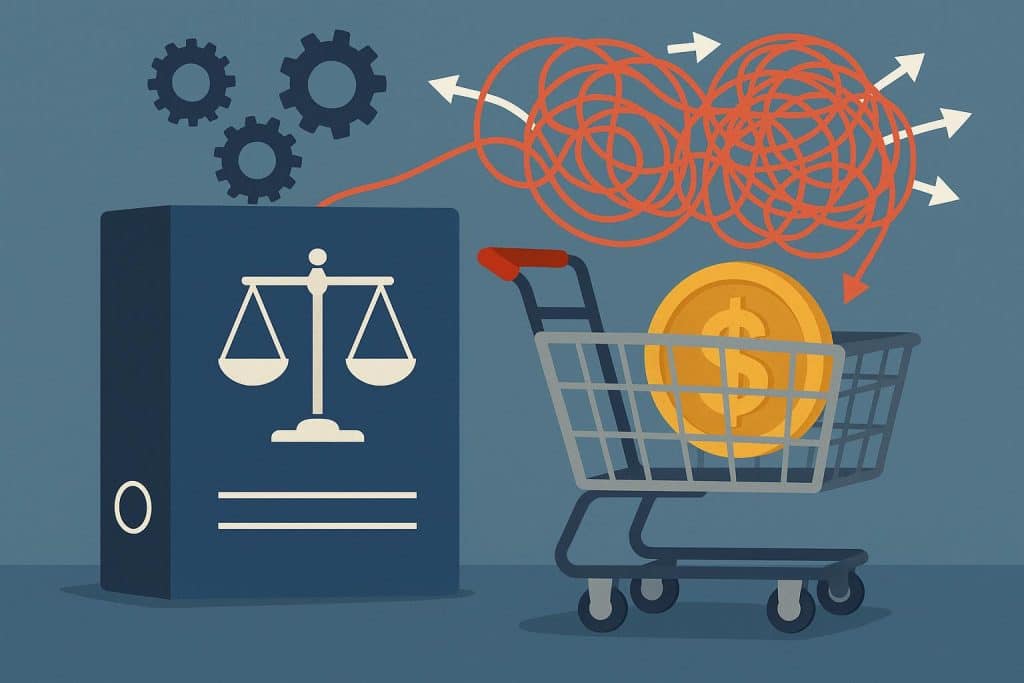Compliance as a Silent Expense
Retailers today face pressures from every direction—rising labor costs, supply chain volatility, and shifting consumer expectations. Yet one cost often goes unnoticed until it creates a crisis: compliance. From product safety and labor laws to environmental regulations and data protection, the growing maze of requirements reshapes retailers’ operations. The question is, has regulatory complexity become the retail industry’s most significant hidden cost?
The Expanding Scope of Retail Regulations
In the past, retail compliance focused mainly on labeling accuracy and workplace safety. Now, the scope has expanded dramatically. Modern retailers must navigate:
- Product safety standards: Ensuring everything from children’s toys to electronics meets national and international benchmarks.
- Labor laws: Covering everything from minimum wage and overtime to anti discrimination policies.
- Data privacy rules include GDPR in Europe, CCPA in California, and emerging frameworks worldwide.
- Environmental regulations: Addressing sustainable sourcing, packaging requirements, and emissions reporting.
Each category carries its rules, often varying by region, state, or country—making compliance a complex, ongoing challenge.
The Hidden Financial Burden
Compliance is rarely listed as a direct line item on financial statements, but its costs ripple throughout operations. These include:
- Training staff: Retailers must regularly educate employees on evolving policies.
- Audits and inspections: Frequent reviews require time and money.
- Documentation: Maintaining accurate records consumes resources that could be directed elsewhere.
- Penalties: Non-compliance can result in steep fines, lawsuits, or bans on selling specific products.
The burden is hefty for mid-sized retailers, who lack the deep compliance teams of large corporations but still face the exact regulatory expectations.
The Cost of Non-Compliance
If compliance is expensive, non-compliance is catastrophic. Beyond fines, violations can devastate customer trust. A high-profile incident—such as mislabeled allergens on food packaging or misuse of customer data—can tarnish a brand’s reputation for years. Retailers are also increasingly subject to public scrutiny through social media. Consumers quickly call out perceived ethical or regulatory missteps, amplifying the financial and reputational risks of falling short.
Why Complexity Is Growing
Several factors are fueling the rise in regulatory complexity:
- Global supply chains: Products often cross multiple borders, each with its own rules.
- Consumer advocacy: Pressure from watchdog groups and consumers has pushed regulators to tighten standards.
- Technology shifts: E-commerce, digital payments, and data-driven marketing have introduced new compliance categories.
- Sustainability focus: Governments and consumers alike demand higher environmental accountability standards.
These dynamics mean retailers can no longer treat compliance as a static obligation—a moving target requiring continuous adaptation.
Technology as a Lifeline
Managing compliance manually is nearly impossible in today’s retail landscape. This is where technology steps in. Automated tools now help retailers monitor regulatory changes, track compliance across supply chains, and generate reports that satisfy auditors.
Platforms designed for compliance management offer:
- Real-time monitoring of evolving regulations.
- Centralized documentation for audits.
- Alerts for upcoming deadlines or gaps.
- Analytics to identify patterns of risk.
Many retailers find that adopting retail compliance software is no longer optional—it’s essential for efficiency and survival.
Balancing Compliance with Innovation
One of the biggest challenges for retailers is balancing compliance with innovation. Regulations can slow product launches, limit marketing strategies, and constrain global expansion. Yet companies that approach compliance as part of their innovation strategy— rather than a hindrance—often discover new opportunities.
For example, meeting sustainability regulations may require upfront investment, but it can also appeal to eco-conscious consumers and differentiate a brand in competitive markets. Similarly, adopting advanced data privacy measures builds customer trust, strengthening long-term loyalty.
The Future of Retail Compliance
Looking ahead, compliance will only grow more complex. Emerging areas like artificial intelligence, biometric payments, and cross-border e-commerce are already prompting discussions about new rules. Retailers that wait until regulations are finalized risk being caught unprepared.
Forward-thinking companies are building compliance into their corporate DNA, treating it as a continuous process rather than an occasional headache. This shift protects them from fines and disruptions and positions them as trusted players in a crowded marketplace.
The Price of Trust
Regulatory complexity may be the retail industry’s most significant hidden cost, but it doesn’t have to be a silent liability. By investing in technology, training, and proactive compliance strategies, retailers can transform compliance from a burden into a competitive advantage. Ultimately, compliance is about more than avoiding penalties—it’s about protecting consumer trust. In retail, trust is the currency that ensures not just survival but long-term success.
